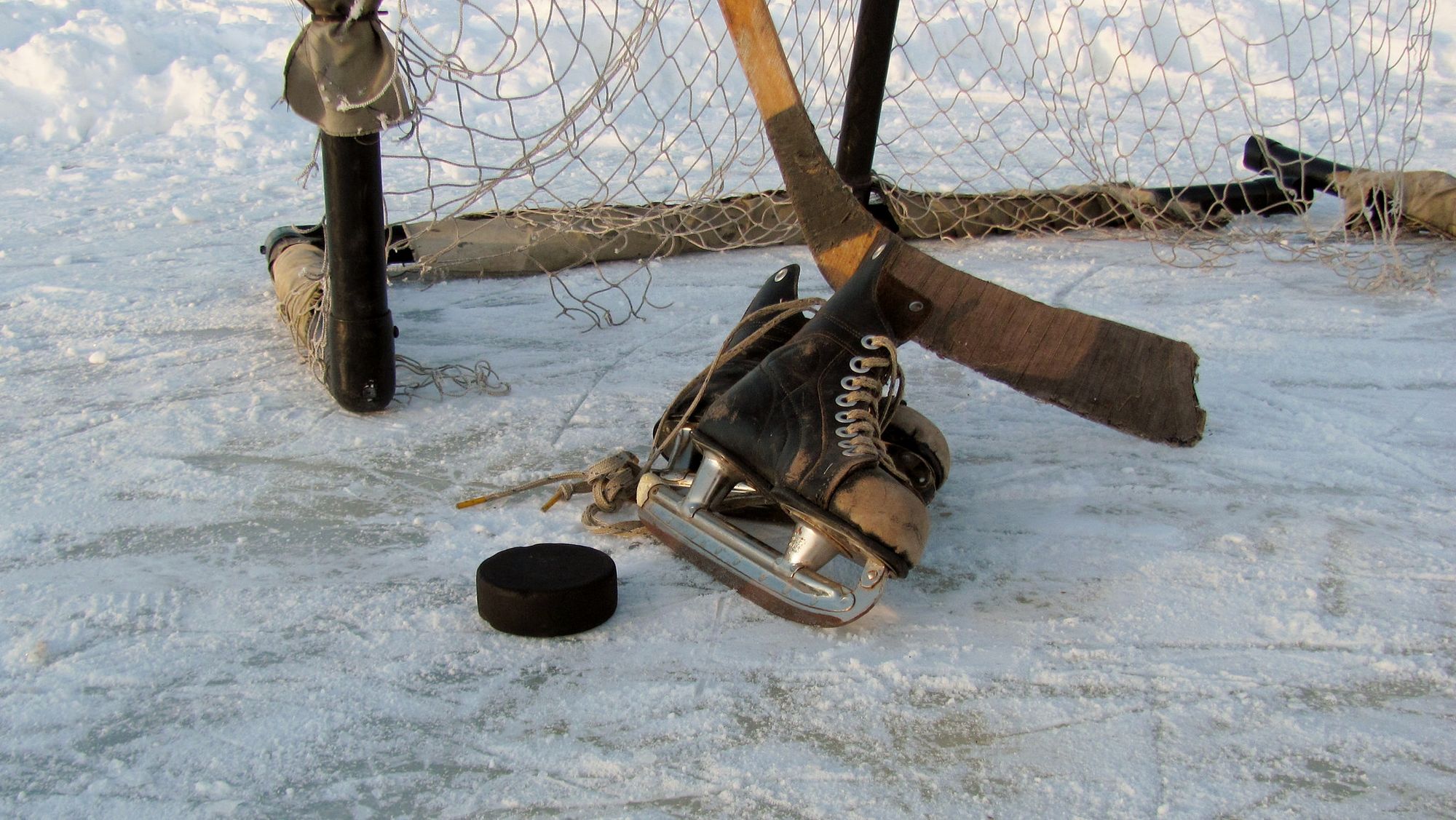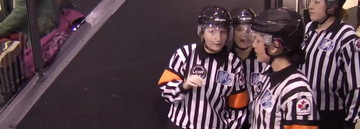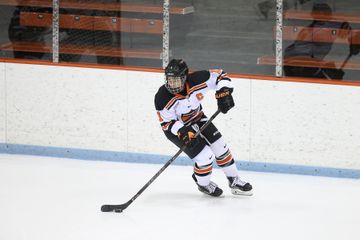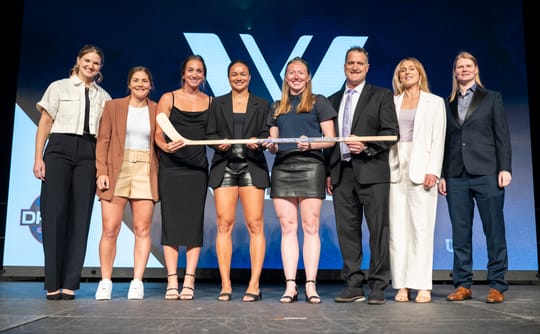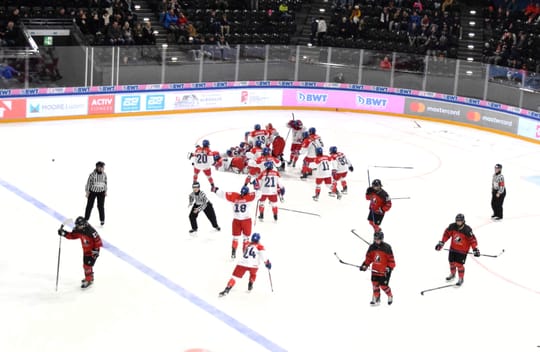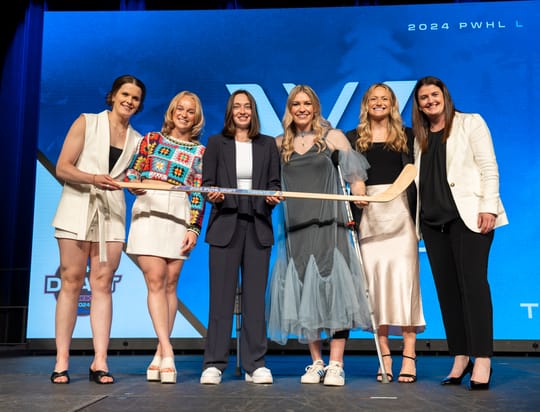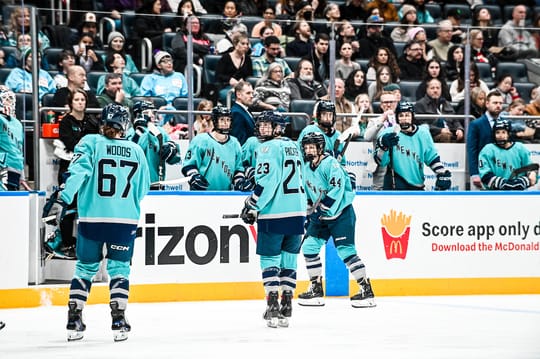Although women's hockey has seen exponential growth since its first Olympic tournament in 1998, there is still much to be done to foster diversity within the game. Both men's and women's hockey suffer from a lack of representation for nonwhite athletes; moreover, it doesn't look as though USA Hockey or any other governing body offers much in the way of changing this trend, aside from offering the most basic of lip service. Hockey as a sport has a long and rich history, but POC are often excluded from the narrative altogether even in places where they have been significant contributors.
The Victory Press gathered five women of color who are involved in different capacities in the world of hockey to discuss this issue. Along with myself, we have Clare Austin, Erica Ayala, C. Diva, and Jashvina Shah. This conversation has been edited and condensed for content and clarity.
AR: We're here to talk about racism in women's hockey. We all know this isn't an issue that is only specific to the women's game or even to hockey in general, but it does get magnified within the community, and especially where representation is concerned. A recent example of this was Blake Bolden's apparent snub by USA Hockey when it came to National Team Selection camp invites. A lot of people believe she should be there, because she's been playing at a high level for the past few years and she has the talent to at least provide depth to the Olympic roster. Bolden is the first black player in the National Women's Hockey League (and I believe she was also the first black CWHL player, but don't quote me on that). She has embraced her role as an advocate for black hockey players, and particularly for black female hockey players. Moreover, in a recent Boston Globe article, it was revealed that she was refused a chance to compete for a spot on the Worlds roster, but was then approached by the same officials once Team USA threatened to boycott. What do you make of the way she's been treated?
CD: It's unfair. She's a good player and role model who works hard and can bring a lot to the team. It's so important that young players be able to see players like themselves on the ice, especially if we want to grow the game.
EA: I came into hockey in general through the NWHL. Blake Bolden was the first player I noticed, because of her shot. I remember thinking I'd hate to be the Riveters going against that. (I also noticed she was the only black person on the ice; I'm sure that contributed to my personal recognition of #10 in yellow.) Bolden has seen success at every level; it is unfortunate that she hasn't broken through to the women's National team. If I read correctly, she has petitioned to be invited to selection camps and has been denied. For USAH to reach out only when they literally had nobody else was heartbreaking to read. The Globe piece posited that her race might have been a contributing factor, and that is frustrating to hear. The piece also alluded to coaches selecting players they know, who they are familiar with. That makes me wonder: how does one become one of those players? What resources does it take, and are players of color situated to do what it takes to make the cut?
JS: USA Hockey does not have a great reputation on a lot of fronts. It sucks that she's being treated this way, because she is a great player -- and it's even more of a snub since they ONLY approached her when they absolutely had no other options.
AR: I think that's what bothers me the most about it as well, is that she has basically fought for recognition, and the only time she does get recognized is as a second option or as a last resort. Considering how talented she is on both sides of the puck (especially with the shot she has) and how apparently USAH has bypassed her for D who seem to be more defensively lacking, it doesn't add up to me.
EA: I agree, for Bolden to not even be offered the opportunity to compete for a spot is nonsense.
Often, "attitude" and "chemistry" are cited as reasons for POC not to be allowed a chance to play in national events, which is code for race and perception of race.
CD: The idea of being a "familiar player" intrigues me though. Really, what does one have to do to gain recognition with the higher-ups? It seems to be that the powers that be couldn't miss her talent, she is phenomenal -- so then what is the real reason behind the snub? Often, "attitude" and "chemistry" are cited as reasons for POC not to be allowed a chance to play in national events, which is code for race and perception of race.
EA: I have never heard any reports to suggest Bolden could be classified as anything less than a team player.
JS: I agree about the coded language used to talk about PoC. I can't recall those things being said publicly about her, but it makes sense for "familiar player" to be used as that coded language instead.
[Editor's note: It is important to note here that "coded language" is usually a tactic of dog-whistle politics, in which the speaker makes a statement that means one basic, superficial thing to the general population, but that has a special undertone for a targeted group. In this context, Blake Bolden could simply be a player under many coaches' radars because she's not well known, but the fact that she is a black hockey player adds layers to the conversation. Why isn't she well-known? What is it about her that has her overlooked? Could it be she's "unfamiliar" because she is black? These are all questions that deserve to be answered. - AR]
CA: This is an area in which I don't have any expertise. Are the players who get onto the rosters usually players who come up through the development system?
EA: I think that is what makes her case so interesting, it all seems to be there...she has been on youth teams, she's been in the USAH system, just never broken through to the senior team.
AR: Bolden was a player who started in the development system, it looks like. She was on the U18 team and was cut from the 2012 or 2013 worlds roster, I believe. There was a suggestion of her conditioning being an issue earlier on when she was first cut, but obviously that isn't the case now. So I'm not sure exactly what it could be.
JS: Seems to me like they're pulling for excuses to not send her an invite. I don't see a reason why she shouldn't be there.
AR: Well, yeah, because now it would be "she's on the older side." [looks quizzically at top 4 D]
JS: I agree with what C said. I feel like this is just an example of them using a different kind of coded language to leave a POC off of the roster.
CD: Institutionalized racism is alive and well in national hockey and in hockey in general. It's not easy to break in as a POC, and it certainly isn't easy as an "older" black woman.
[Editor's note: regarding representation, USA Hockey never responded to my query on numbers or statistics on players of color in their developmental programs or any affiliated camps; Hockey Canada did clarify that "this is not information that we gather or track," going on to say that it "believes that the game should be accessible to all; and we actively promote programs that seek to introduce hockey to Canadians -– regardless of their gender, religion, or ethnic background." I was then pointed to a number of programs aimed at new players, new hockey families, and even new Canadians, including those that are specific to women's hockey. None of them are aimed explicitly at getting more girls of color interested. - AR]
AR: Diva did make a very good point about the language that surrounds athletes of color, though. On the men's side, we see "attitude," "character," "work ethic," and other adjectives as things lobbed around to criticize any player who isn't a white North American. What language might you see surrounding non-white women's players?
EA: I think the problem is that they aren't spoken about -- unless it's February.
JS: I can't think of many non-white women's players. The only three that I can name off the top of my head are Bolden, Koelzer, and Newell. And outside of us (people who follow the sport closely or in the case of the last two, the Princeton community) I don't see people really talking about them.
AR: Jessica Koizumi, Julie Chu...and Kaliya Johnson as well.
CD: I think the fact that Koelzer was named is great, but she is younger, and as women, we all know that ageism is a factor as well.
AR: The problem is we can probably count them on two hands. Maybe.
EA: [Sarah] Nurse, as well as Huertas, Llanes, Kunichika.
JS: I can't recall hearing any coded language about any of those players.
CA: As a Native, I think that my experience is that Native-ness is rarely spoken of and rarely considered. Natives aren't even counted in most casual conversations. Given the number of Native girls' teams, I would be shocked if there weren't at least one or two Native players in the NCAA, but you really have to know who and how to ask to find that out.
JS: I very rarely hear ANYTHING about those players.
***AR:***This is true, Clare. I can't think of very many Native players I've heard of (Brigette Lacquette is it). [Lacquette plays for the Calgary Inferno of the Canadian Women's Hockey League, and was a standout blueliner before that for the University of Minnesota Duluth Bulldogs.]
CD: I think that if we are going to find out anything about WOC players, we have to follow them closely their entire career. I would think outlets probably believe there is a small niche audience that cares about women's hockey, let alone WOC in hockey.
EA: The women I've spoken to don't feel that there is coded language in the women's game (not from their teammates, anyway). Huertas did say most people will assume she is black or Mexican. When she says she's Cuban, she's been asked if she speaks "Cuban" -- others just continued to call her Mexican.
CD: But Erica, there is coded language everywhere...isn't there? i mean, I would assume that every POC has experienced it at work, school, etc.
JS: There may be coded language, but I don't think it's seen as much in women's hockey the way you see it in men's, like how Angelica mentioned "character issues" as one.
EA: In the women's game, the sense I get is, they have all been the other because of their gender, that there is less feeling of "otherness" than playing with boys.
AR: I will say when I spoke to Bolden, Chu, and Koizumi a year ago for my role models piece, all of them brought up representation and not seeing very many players who looked like them. In fact, Julie Chu was the trailblazer for Asian-Americans. Which, the word "trailblazer" and words like it ("pioneer," "barrier breaking," etc.) are used a LOT in women's hockey, but it seems to be extra focused on WOC. Do you guys notice that at all when reading about them? Any women's hockey player is already a trailblazer, but then you have a black player in a white-dominated sport...
JS: I agree with you. I also think we've seen more stories focused on the racism those players deal with in women's hockey than in men's hockey.
CD: Instead of coded language, then, are we just seeing an absence of WOC? Invisibility is worse than being talked down to, I would say.
EA: And yes, as a black Latina, I would say there is always coded language...but more in the form of microaggressions (Are you Mexican? What kind of band-aids do you use? Why don't you wash your hair every day?)
CA: My experience is in absence, frankly. Other than mascots.
JS: I agree with Erica. I think it's more general coded language we all see than hockey-specific ones that people would normally cite to keep a POC off their team (like what happened with PK Subban). If that makes sense. If anything I'm saying makes sense.
EA: That's interesting, Clare; and I think women's hockey is a sport that is absent of a way to talk about race and culture.
AR: You're making sense, Jashvina! It definitely is [lacking a way to talk about race], and I think it's that way by design, which segues into another topic I'd love to talk about in just a bit, but first...getting back to Erica's point about resources, those are definitely key in any sport, but especially about hockey. It's an expensive sport, where even basic equipment for a skater can run over $350 and basic clinics cost another [$200 to $300]. Families also sacrifice a lot in travel and food costs to keep their kid healthy and playing. While there are inner city hockey programs, a. Are there enough? b. Are they visible enough? c. What kind of help do they get to make costs easier for kids of color to play?
JS: I honestly know of just a few, and I don't think they're that visible.
AR: Gabie Figueroa helped start one, no? [Kind of. She is working as a project engineer for the company that is converting the Kingsbridge Armory into a nine-rink sports complex and community center. The center would allow for low-income families to participate in hockey via free ice time and equipment, according to a New York Post article on the project being stalled last winter by New York City's mayor, Bill de Blasio. As of early 2017, the project was slated to get a $108 million boost in funding from New York State Governor Andrew Cuomo. - AR]
JS: Hockey In Harlem is the most visible to me, but I think that might just be because men's college teams (BU does it every other year) skates there. We do have Hockey In Newark, but I don't think the program is talked about or has helped as much as it could/should be.
EA: On resources: inner city programs seem to be relatively new.
AR: I want to say that they are fairly new in the grand scheme of things. There are also programs like Harborcenter's Academy of Hockey, which is located IN the city, but I'm not sure it qualifies as "inner-city," if you catch my drift.
CD: As a Californian, it is difficult to find youth hockey programs, let alone girls' hockey. Even when I did some research, the rinks are in high-income neighborhoods, mostly near the NHL teams. The West[ern] and Southern regions could be so important for development, but there are little to no opportunities for kids of color in urban areas.
CA: Being in Nashville, we've only recently begun to get any kids into hockey. Aside from some floor hockey days at area schools, I know of no "inner city" programs for playing hockey here.
EA: Well, where in the U.S. can one even access ice? Do these places even have "inner city areas"? Hockey is not widespread, and girls' programs are just reaching an era where girls can grow up never having to play with boys.
CA: I think PK Subban has done some work with getting kids tickets to see games, but I don't know of anything specific to playing hockey.
AR: Buffalo is rich in youth hockey, but I haven't come across anything that's geared toward getting kids of color (let alone girls of color) into hockey. Lots of them [are] in the suburbs, and our transit system is a disaster, so good luck to anyone without a car trying to play some puck.
CD: I mean, I have a 14-year-old daughter and even if she wanted to get into hockey, the nearest rink has a boys-only league. If I wanted to get her on a team, I would have to drive to Orange County (and deal with Ducks fans). And...Orange County is hella expensive, so everything costs more -- joining, equipment, lessons, etc.
JS: I guess it makes sense that my area (NY/NJ/Philly) has the most. Although I'm actually not sure if there's one in Philly.
EA: That's what Kaliya Johnson's mom had to do...1.5 hours one way with traffic to Anaheim.
CA: Jenny Scrivens told me about driving four hours to go to play hockey as a girl in California.
AR: I guess a better point would be, with the growth of women's and girls' hockey, there also needs to be a push to get girls of color integrated into the sport. I mean, that would only help with #growingthegame, would it not?
EA: The sport has "grown" without the support of people of color. Once "the folks" get into hockey, I think we'll see the game as a whole grow stronger.
CA: I will say that Canada has a lot of Native girls teams. But by the time they're high school age, most of those girls drop out. And for a lot of Native folks, we see it as kind of "our" sport to begin with. It's just too expensive to keep it up and the distance is also a big problem for Native teams.
CD: I think of the Soul on Ice documentary and wonder how can POC support a sport that viscerally doesn't want to support them.
JS: That's what's tough, and I'm not sure how POC do it. It's an atmosphere that isn't very welcoming, and at times does its very best to kick POC out.
EA: As far as girls, Hockey in Harlem/Newark do have special programs for girls, but there is little chance that a girl of color will play a sport that isn't offered at her school. Women in sport is growing, but Title IX has left women of color behind, as they are not playing rapidly growing sports like ice hockey, soccer, and lacrosse.
AR: That makes sense. Commuting is a big issue. At school, she's already there, everything is in one place. Start trying to add sports in and it becomes a hassle. But I feel like even with inner city programs in place and going strong, it's still an uphill battle for kids of color to succeed in hockey...because then it becomes "Oh, well, you didn't go to THIS camp or THAT prep school, all you did was play inner city hockey? Why should I take you seriously?"
CA: Bingo.
EA: Exactly. And that's what has done Bolden in. However, Kelsey stayed local in NJ, went to public school, and has now broken through to her first senior camp.
[Editor's note: I attempted to contact D1 and D2 prep schools in the Northeast to see whether their athletic directors and hockey coaches worked to recruit players of color specifically as a means of diversifying. As of May 19, I had not gotten a response via email from over 16 schools, including The Rivers School, The Gunnery, Brooks School, Tabor Academy, and Williston Northampton. - AR]
JS: That's so ridiculous. I get where it comes from, though, because hockey is a weird cult where everything and everyone has to conform.
AR: Is she [Koelzer] the exception, though?
CD: I would think she is an exception, to be honest.
CA: These young girls aren't getting recruited into the schools that will channel them up into higher levels.
EA: As it might be unfair to say Bolden hasn't broken through because of her race, is it unfair to say that Koelzer is having a shot because of players like Bolden? [In other words,] has Bolden pushed the issue so that USAH has to give Koelzer a shot?
AR: Perhaps. Maybe that then becomes [USA Hockey's] "I have a black friend," though. "Look, it's not a race issue, Kelsey Koelzer's here." And in the same way Bolden opens the door for black players, Koelzer can open the door for players who didn't go "prep school" so to speak...I'd just hate for that to come at Bolden's expense.
CD: Erica, I get what you're saying, but then other factors come into play, such as age, school, "familiarity," and so on.
JS: She might be, but I'm sure her performance of late, coupled with being a candidate for Patty Kaz [the Patty Kazmaier Award, given to the top NCAA women's hockey player each season] hasn't hurt.
EA: Wasn't Bolden also a Patty Kaz finalist? [She was a finalist in 2012. - AR]
JS: Does her [Koelzer] going to Princeton have anything to do with it?
EA: They are similar on paper...I don't know, would it? Compared to BC?
JS: Princeton isn't bad for women's hockey and they've gotten better lately. One of their assistant coaches coached for the U18 women and they have some of their players with Canada's U20 team, I think. Or they had players on the U18 team. My memory is fuzzy. So they're not bad at hockey, and Koelzer did have a huge breakout year when they swapped her from forward to defense.
JS: I agree with Erica and Angelica -- USA Hockey is super political, so after Bolden has pushed it they probably don't want to have her. But they see it as good optics for them to have a black player.
I think the lack of intersectionality can certainly be explained by a lack of representation or access, but also by the idea that women's hockey players are afraid to alienate anyone who might watch.
CD: It does. Bolden deserves better, but it seems that she is doing things in her community and has her own website now to get her name out there, which is a good thing.
AR: So with all of this in mind..."Hockey is for Everyone" rings pretty fucking hollow, doesn't it? (Pardon my French.)
JS: Hockey should be for everyone, but it definitely is not.
AR: That's what's been kicking around in my mind this whole time. Even on the men's side, we talk about hockey being "for everyone." But with a lack of access, representation, and resources for players who aren't white (or cisgender, or male, for that matter), what does that actually mean other than a nice ad campaign?
JS: That's all it is. It's so they can "pretend" they're doing something for those who aren't cisgender white males, but they're literally doing nothing.
AR: And with the pretty idea of "following the dream" there that Diva mentioned, I feel like it's a cruel prank.
EA: Hockey is NOT EVEN FOR WHITE WOMEN IN AMERICA. (Sorry, I'm fresh off some UND reading, and QU, and WNT...There is no respect for female players.)
CD: Goodness! Can we get more women coaching women's hockey, please?
CA: Ooh, that's a whole other discussion.
AR: Well, to be fair, didn't Heather Linstad get embroiled in a sexual assault case at UConn? Not excusing [QU], just saying women can be utter shit too.
EA: Yes, but all of this speaks to something that was mentioned earlier, I think...systemic racism and sexism has a HUGE role in representation.
AR: Yes, it does, and I think this might circle back to the point you made earlier, but do you want to elaborate on that before I switch gears slightly?
EA: Oh, just about how (white) women in the sport are treated? Hockey is unkind to women who play, and that can even be with a woman in charge (NWHL pay cuts much?)
CA: It is unkind to women who watch, too.
JS: And unkind to women who cover it.
CD: I teach at a local university, and we discuss women's hockey in terms of media representation and wage gap. While I don't know if that is an issue with WOC players, it's really disturbing the way that women's hockey and sports in general are disdained by their nationally recognized male counterparts.
EA: I think you mentioned "feminism" in the prompts, Angelica, and I think we see that at play in women's hockey.
CD: But is it intersectional feminism? I honestly don't know and am posing the question.
JS: I'm going to say it's not intersectional, because there have been issues with some UWSNT players liking/posting things on social media they shouldn't.
If you say something, you're a character issue.
CA: Brianne McLaughlin and her headdress...I hate to pick on one person, though, because it's a systemic issue.
AR: Regarding feminism and women's hockey: personally speaking, I'm ambivalent about this in that I don't really care whether or not a player explicitly identifies as feminist, BUT I also don't think you can afford not to harbor some feminist ideals while playing because that's the point we're at. Speaking to intersectionality, however...there is none when it comes to women's hockey. (As y'all are already saying.)
JS: I think, based on the way society views women and their relationship to sports, playing sports is definitely a feminist act.
CD: Institutionalized racism is thick in the sport in general. Trying to dissect that would be impossible. It's got to start with individuals, players, advocates, etc.
CA: Agreed. And it is empowering for me at times.
AR: We saw feminism at work when the women's team went on strike for equal pay. But we also see white privilege and racism at work when Brianne McLaughlin decides to #AllLivesMatter a CNN broadcast. Or when the WNBA and Megan Rapinoe stand up for black lives (and get penalized for it); not a word of it is mentioned in women's hockey (or hockey in general) and the Buffalo Beauts decide to do promo videos with transit police -- funny ones at that. I think the lack of intersectionality can be explained by a lack of representation or access, but also by the idea that women's hockey players are afraid to alienate anyone who might possibly watch.
CD: NOT A DAMN WORD. But really, who is going to advocate? There are so few POC in male or female hockey. The team mentality doesn't allow for individual thoughts to be expressed. We need entire organizations to stand up for "the thing".
EA: So, white men. Which is so frustrating!
CA: And again we're back to the fact that this is a white, upper middle-class sport for a large part, and intersectionality comes hard unless you've lived it.
CD: And in Blake's case, even "living it" and working hard doesn't cut it.
AR: But even if you have lived it and want to speak out, you can get silenced.
JS: I feel like ESPECIALLY in women's hockey because it's so, so small, you're more likely to be alienated and silenced.
EA: Yes, very true.
CA: And there is so much emphasis on being a "team player."
AR: It's the idea of "you need to conform because we're a team" meshed with "you can't say this because no one will watch us if you make them angry."
CA: It's true in writing and other endeavors, too.
CD: That team mentality is equally wonderful and frustrating.
AR: Which is why Native issues, black issues, immigrant issues get silenced. Women's issues are en vogue thanks to white feminists like Dunham, Schumer, et al., so it gets packaged in this "equal pay, we're strong" sort of way; but that's it.
JS: It's frustrating across hockey as a whole. It's a literal, actual cult, and that makes it much harder for people to speak out against racism and other serious issues. If you say something, you're a character issue. At least that's how I feel in college hockey. These people don't realize how much harder it is for POC to make it and the specific challenges they face.
EA: Does the media (and really, the college teams, USAH and the two leagues) play a role in the lack of a narrative?
JS: [I think] the media does.
CA: I remember a fairly prominent blogger giving advice on getting hired by an (NHL) team that was, "Don't be political." My entire existence is a political act.
Until people begin to think about the ramifications of whiteness, the way it underpins every aspect of our social, legal, and economic lives, we'll continue to have to have this conversation. But the conversation itself is our best weapon.
CD: Well, politics covers basically all social issues. Anything about race, sex, and equality can be construed as political.
AR: The NHL is THE MOST apolitical. Even their "acceptance" campaigns are apolitical. It's a sham.
JS: Just the degree of ignorance needed to make the "don't be political" statement is...I want to throw my computer across the room.
JS: And the worst part is, the people who control the narratives based on their position (cough cough old white men) think they're the greatest and know everything and if you TRY to politely correct and help them, it's the end of the world.
CD: There is a consensus, don't you think? "We won't talk about politics if you don't talk about politics"?
JS: I was taught that there's no such thing as objectivity in journalism. We all see things through our particular lens. The people in positions of power in media see everything through a no racism/sexism/homophobia lens, because they don't experience [it].
AR: But we can't just stick to sports in women's hockey, can we? Seeing as it's becoming a political thing by virtue of the fact that women's players don't get their due. "I never see this!" Well, of course you wouldn't, you're a dude.
CA: I don't think I can stick to sports in any league.
CD: I was just having this conversation today with my students about objectivity and bias. We all have them, but if the media [and the powers that be] are only cis white dudes/women, how do POC get representation? How do queer folks get representation? Is it all out of the generosity of the old white dudes in charge?
EA: ...It's like the hunter telling the lion's story (African proverb). We need the lion's story from her. In her own words.
CA: I've said it in the past. There are white, cis, male editors out there with the power to open these doors, but as long as they refuse to see the political angle as valid, they refuse to acknowledge that the door is closed.
CD: Which is why we need WOC in the offices, paying the bills and doing the hiring...that's another HUGE issue.
EA: But it's got to be more than just women.
AR: So where do you think the change most has to begin?
CD: Change has to begin right here, with women like you all. Sharing the good news with our fellow hockey fans and our families, men, women, white, people of color, everyone and all of them.
JS: I think writing and talking about it helps. I feel like social media has helped spread that word and if these things get written about, they'll get noticed.
EA: I agree, and with more opportunities. I mean, correct me if I'm wrong, but were there any POC on the NWHL broadcast other than me in two years?
JS: Erica, I don't believe so. And I don't believe there have been any POC on CWHL broadcasts? I've found, and I thought that no one listened to me when I talk about all this stuff, but over the past couple years I've started to notice a difference in college hockey. People have actually listened to me and altered their view, even if it is subtle.
EA: That's important too, to stay the course.
CA: Personal perspective: I have a fantastic editor who supports me in saying what I want to say on social media. I still can't write it in an official capacity, though. Because politics. We depend on access. And that's the bottom line. On the other hand, he never asks me to write about the Chicago Racial Mascots...
AR: Can't talk politics or you'll offend someone, Clare. Right? (eye roll)
CA: For me, as a part of a media company, it's a media issue. We have to be able to talk to goalies. If they refuse, we're stuck. As a fan, I could care less most of the time.
EA: As theoretical gatekeepers, we need to swing those suckers open a bit more into the intricacies that exist in players and the sport as a whole.
JS: Access isn't something I worry about, whether it's with players or coaches. I benefit from college hockey being small -- and these people know that they need me.
CD: I don't know, I think that giving fans access to the sport in general is important in terms of spreading awareness of the game -- I mean, regarding race specifically. The media definitely has a lot to do with that, but so do club executives.
CA: Working at the NHL level, I think, gives the players a bit more power over whether to give an interview. I've only ever been turned down by one women's player. And it's much easier, I found, to talk to women players about being women than about race.
JS: Yeah. There's a lot more coverage in the NHL, so media is fighting for that access. For me, there's not enough coverage, so teams are fighting for us to cover them, if that makes sense. I really struggle with talking about race with players.
AR: So do I. It's like they don't want to bring attention to it.
CA: Again, this is white feminism playing out. It's easy to sort of ignore the racial aspects when doing an interview, especially when it might come across as accusatory. Like with mascots and headdresses.
JS: For me, it's just because I know how I would've felt when I was 18 or 19 and someone asked me about it. I wouldn't have wanted to talk about it. And I always hesitate putting college-aged kids in that much of an uncomfortable spot. I'm getting better at it, but it's still...tough.
CD: And it's probably something where POC players have been conditioned not to respond.
AR: With all of this taken into account, then, to end our conversation, let me posit: Will we still be having this conversation in five years' time? If so, why; if not, why not; and what can we do to move it forward?
CA: I think we will. While I wouldn't be surprised to see an increase in representation from a demographic standpoint, I don't see much willingness to grapple with the overwhelming whiteness of hockey among the folks who lead and coach and recruit. Any more than that is present in the larger culture of North America. There may be more recruiting of Native players, for instance, but they will still be brought into a space that sees difference as deficiency.
I can't say whether it is a good thing or not to increase Native women's exposure to these conditions. Until people begin to think about the ramifications of whiteness, the way it underpins every aspect of our social, legal, and economic lives, we'll continue to have to have this conversation. But the conversation itself is our best weapon. It is a conversation about accountability and respect. It is a conversation about what we want our community to be and what rules we want to live by. This is the necessary work to move forward.
Why do black players expect to be called "nigger" in Boston? Why are women expected to only have as much value as their famous male relatives or partners? How can we ask questions that open dialogue, rather than further draw lines in the sand?
JS: I hope we're not still having this conversation in the next five years, but I feel like we will be. Or rather, I think we'll be having a conversation where there's still a lack of diversity and a lot of racism. There's been this idea promoted by some that minorities should silently work hard, and that's the best way to advance themselves and marginalized people. However, that's false, and we're seeing the effects of that silence in our world right now. In my experience (at least), people aren't racist in overly noticeable ways; they disguise it using coded language and such, and it's usually language that's ignored or dismissed instead of being rooted out. The best way to advance this is to keep talking about it. The more people who bring attention to lack of diversity or racism in the sport, the more chances we have of actively weeding it out and advancing minorities. If everyone is open about this dialogue now, instead of acting like it's a forbidden topic, we have a much better chance at advancing.
EA: Yes, I do think we will be having this conversation in five years. Race and the complexities around racism are not communications muscles that we as a society have developed.
What can be done to move things forward? More conversations. We need to make racism, micro-aggressions, sexism, and other social issues part of our daily conversations. Not in a "Dear White People" or "Get Out" way. We need real, concrete stories to be told. Stories that don't over-glorify or over-exaggerate unity (the way of Jackie Robinson), but instead deal with the complexities that are socially created "isms."
Why do black players expect to be called "nigger" in Boston? Why are women expected to only have as much value as their famous male relatives or partners? How can we ask questions that open dialogue, rather than further draw lines in the sand?
(Photo credit: RichardBH/Flickr)
